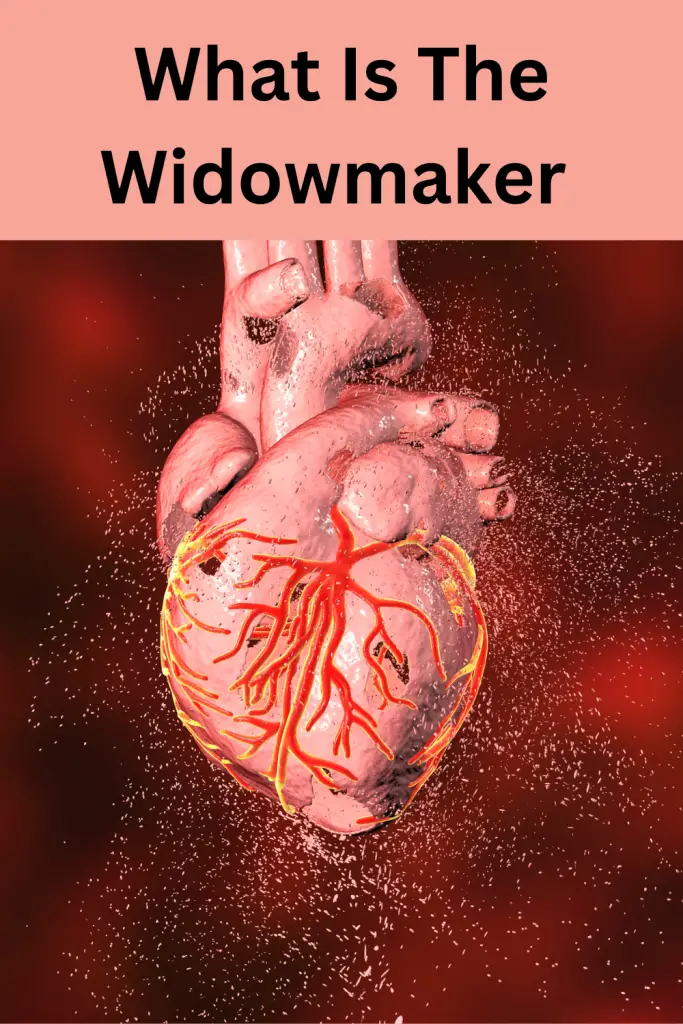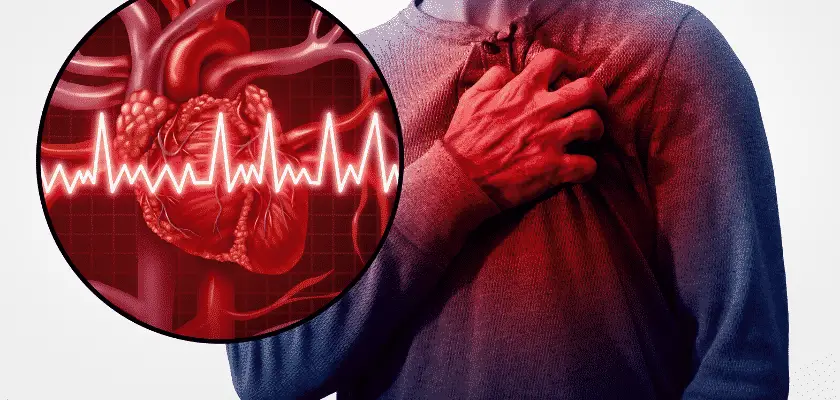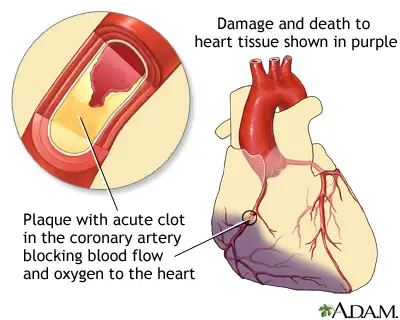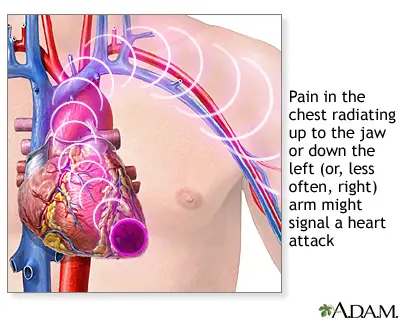Updated 5/10/2023
A widowmaker heart attack is a type of heart attack that is caused by a complete blockage of the left main artery or left anterior descending (LAD) artery. This is called a widowmaker heart attack.
It’s also referred to as a chronic total obstruction (CTO). In this article, I will discuss the widowmaker heart attack including symptoms, treatment, and what you can expect from the emergency room. The following are the widowmaker heart attack facts and the warning signs of a heart attack.
Why is the LAD Most Commonly Occluded?
Here are a few reasons why the LAD artery is often the one that gets blocked: long pathway, high blood flow, location and lifestyle factors.
- Long Pathway: The LAD artery has a long course as it travels down the front of the heart. This makes it more exposed to problems that can lead to blockage.
- High Blood Flow: The LAD artery supplies blood to a large area of the heart. Because of this, a lot of blood flows through it. High blood flow can cause wear and tear, making it more prone to blockage.
- Location: The LAD is situated in a place where fatty deposits or “plaques” are more likely to build up. These plaques narrow the artery and can eventually block it.
- Lifestyle Factors: Bad habits like poor diet, lack of exercise, and smoking can also contribute. These factors can lead to the buildup of plaques in the LAD artery more than in other arteries.

Widowmaker Heart Attack Facts
According to the National Institute of Health, the left anterior descending artery transports large amounts of fresh blood into your heart muscle so that the heart muscle gets the oxygen it needs to pump properly.
When the artery blocks and there is no blood passing through, then your heart can quickly run out of oxygen and stop beating thus the widowmaker heart attack.
Most of the time the left anterior artery gets blocked up with plaque from cholesterol. This condition is referred to as atherosclerosis also known as the hardening of the arteries.
The plaque can cause blood clots that clog the artery. Sometimes the blood clots build up quickly and instantly lead to the complete blockage of the left anterior artery.
This is why this type of heart attack is called a widowmaker heart attack: because the outcome is usually grim when the left anterior descending artery is blocked. This is why it is called a widowmaker heart attack. A widowmaker heart attack usually occurs when there is a 100% blacked artery. This is why it is called a widowmaker heart attack.

Signs and Symptoms of the Widow Maker Heart Attack.
The signs and symptoms of a widowmaker heart attack are almost the same as those of any type of heart attack, thus you can’t tell when someone is experiencing a widowmaker heart attack from the outside.
- Chest pain or chest discomfort.
- You might experience squeezing, pressure, or fullness in the center of your chest. The discomfort might go away and then come back.
- You can experience upper body pain, including shoulder and back pain.
- You might experience pain in your jaw, stomach, or neck.
- Shortness of breath. People have described it as feeling like an “elephant on the chest”.
- Nausea and vomiting
- Lightheaded
- Cold sweats
- Stomach pain that feels like heartburn ( many women experience this symptom)
- Pain in your neck that feels like a pulled muscle
- Feeling like an impended doom
- Palpitations
- Many women have these symptoms without having chest pain.
Causes of the Widowmaker Heart Attack.
Most heart attacks, including widow makers, are a result of a combination of lifestyle and genetic reasons. Whereas, cholesterol and fatty plaque block your arteries over time and prevent blood flow.
The causes include:
- Smoking and chewing tobacco
- Obesity
- Eating unhealthy foods, such as a diet high in sugar and processed foods.
- Lack of exercise
- High blood pressure
- Diabetes
- Family history
- High cholesterol
- Inflammatory diseases
Widowmaker Treatments
Coronary artery bypass grafting (CABG)
The surgeon moves the blood through a new blood vessel around the blockage using a piece of a healthy artery or vein called an artery graft from other parts of your body like your leg, arm, or chest.
Risks of bypass surgery.
- Bleeding.
- Infection.
- Confusion or memory loss
- Abnormal heart rhythms.
- Kidney problems
- Heart attack
- Angioplasty
The surgeon threads a thin tube called a catheter through a small cut in your groin or arm and up a blood vessel to your heart. Then a tiny balloon is inserted into the blocked blood vessel, and it is inflated to widen the vessel.

Risks of angioplasty include:
- Bleeding
- Blood clots
- Re-narrowing of the arteries also known as restenosis
- Damaging the coronary artery
- Kidney problems
- Stroke.
- Valve replacement-The doctor uses a healthy heart valve, usually from a human donor, pork tissue, or beef tissue to replace a blocked or unhealthy valve.
Your chances of Surviving the widowmaker heart attack are dependent on factors such as:
- How fast you receive treatment
- The treatment you received
- How your body responds to the treatment
- How your body reacts after the heart attack
Medications
Some of the medications given to treat a heart attack might include:
- Aspirin-aspirin reduces clotting and helps maintain blood flow in the artery
- Beta-Blocker- Beta-blockers will reduce the heart rate. Reducing the heart rate puts less stress on the heart.
- Nitroglycerin- Nitroglycerin will dilate the arteries. This accomplishes two things: it dilates the arteries, which allows the blood to flow freely. Nitroglycerin also reduces chest pain.
- Thrombolytic- Thrombolytics are blood thinners. Blood thinners are used to clear blood clots blocking the artery.
- Antiplatelet medications- Aspirin and Plavix are considered antiplatelet medications.
- Ace inhibitors
- Statins
Tips to Help Reduce Your Chances of Having A Widowmaker Heart Attack
- Quit smoking and quit using tobacco products
- Control your bad cholesterol
- Maintain normal blood pressure
- Maintain normal weight
- Exercise at least 3 times a week
- If you are a diabetic, control your glucose levels. Diabetes and heart disease are related.
- Limit alcohol consumption
- Reduce stress
Conclusion
If you experience any of these signs and symptoms, make sure to visit your doctor or a cardiologist regularly for physical exams. If you have any chest pains or signs of a heart attack, call 911. These are all widowmaker heart attack facts.
FAQ
1. What is a Widowmaker Heart Attack? A Widowmaker heart attack is a type of myocardial infarction caused by a 100% blockage of the left anterior descending (LAD) artery, which is a major pipeline supplying blood to the heart. Because the blockage in a Widowmaker heart attack is so severe, it has a high fatality rate, hence its ominous name.
2. What Causes a Widowmaker Heart Attack? Just like any other heart attack, a Widowmaker is usually caused by coronary artery disease (CAD). This condition develops when the coronary arteries (the blood vessels that supply blood to the heart muscle) are narrowed or blocked by a buildup of fatty deposits called plaques.
3. What are the Symptoms? Symptoms of a Widowmaker heart attack are similar to those of other heart attacks and may include chest pain or discomfort; discomfort in the arms, back, neck, jaw, or stomach; shortness of breath; cold sweats; nausea; lightheadedness; or discomfort that doesn’t go away or changes from its usual pattern (for instance, occurs more frequently or while at rest).
4. How is a Widowmaker Heart Attack Treated? Immediate treatment is critical to surviving a Widowmaker heart attack. This typically involves emergency surgery to clear the blockage, such as angioplasty and stenting or coronary artery bypass grafting (CABG).
5. Can a Widowmaker Heart Attack be Prevented? A healthy lifestyle can significantly reduce the risk of a Widowmaker heart attack. This includes a healthy diet, regular exercise, maintaining a healthy weight, not smoking, and controlling conditions like diabetes, high blood pressure, and high cholesterol. Regular check-ups with a healthcare provider are also important for early detection and treatment of conditions that can lead to a heart attack.
Remember, a Widowmaker heart attack is a medical emergency. If you or someone else experiences symptoms of a heart attack, seek emergency medical help immediately.
Related Articles
Will a heart attack show up on an EKG?
What is a widowmaker heart attack?
My name is Phyllis Robinson MSN, RN. I have been a Registered Nurse for 27 years in the Cardiac Intensive Care Unit. I am passionate about cardiac care and heart disease. I also want this blog to be an educational tool that people can refer to for traditional and alternative treatment. I will blog on heart disorders such as high blood pressure, congestive heart failure, cardiomyopathy, and high cholesterol.
I received my Nursing degree from Baltimore Community College.
I went on to receive my Masters in Nursing from Walden University
I have worked for almost 30 years in Critical Care with a focus on heart health. I am an advocate of preventive healthcare.



